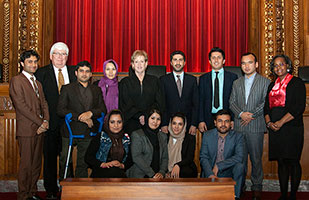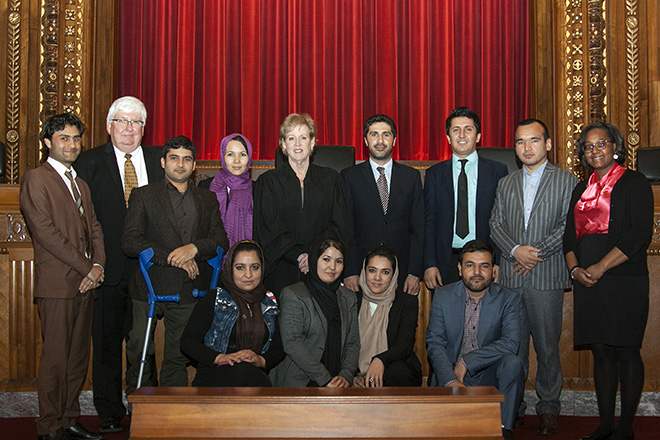Afghan Legal, Court Officials Visit Ohio Supreme Court

Ohio Supreme Court Chief Justice Maureen O’Connor posed with nine lawyers and one judge from Afghanistan who are enrolled in a Master of Laws degree program at Ohio Northern University. The group observed Supreme Court oral arguments and then participated a Q&A session with the Chief Justice afterward.

Ohio Supreme Court Chief Justice Maureen O’Connor posed with nine lawyers and one judge from Afghanistan who are enrolled in a Master of Laws degree program at Ohio Northern University. The group observed Supreme Court oral arguments and then participated a Q&A session with the Chief Justice afterward.
While the Ohio Supreme Court heard oral arguments on April 5 about appeals in four cases, lawyers and one judge from Afghanistan were watching from the audience.
They are in the United States as part of a program at the Claude W. Pettit College of Law at Ohio Northern University. Amanullah Ahmadzai is a law professor at Kabul University, and was among the 10 who arrived in February to begin their studies.
“This is a good opportunity to study at a United States university, learn about the rule of law, and take what we have learned back to our country,” Ahmadzai said.
After oral arguments, Chief Justice Maureen O’Connor met with the group to discuss what they saw and answer questions about the Ohio court system.
“Oral argument is a valued exercise and helps us decide cases,” Chief Justice O’Connor said. “We can have our opinions changed by oral arguments. You can’t tell how the justices will vote based on the questions they asked.”
She also addressed a question about why justices make their votes public. The Afghanistan visitors thought that there was an element of danger from retribution by one of the interested parties. Chief Justice O’Connor explained that public votes by judges are part of the American judicial system and because there is a respect for the rule of law, releasing a judicial vote is not a problem.
Assia Nazari was interested in the idea of the Supreme Court setting precedent with its decisions. In her country, “the judge only applies the law and the decision is not precedent,” Nazari said afterward, adding there are also no juries in Afghan courts.
The law school began its LL.M. in Democratic Governance and Rule of Law program more than 10 years ago and has educated nearly 100 lawyers from more than 30 countries, including 19 Afghans. The program is designed to give lawyers specific skills necessary to promote democracy and the rule of law in transitional countries.


